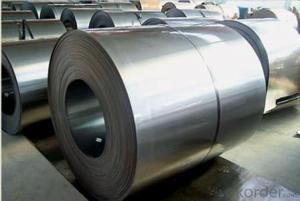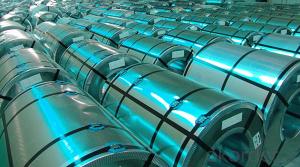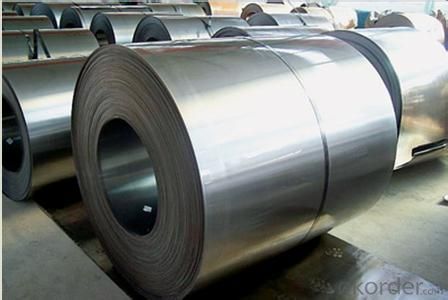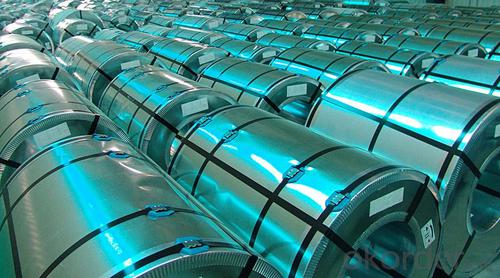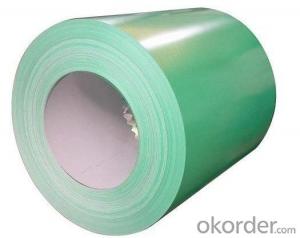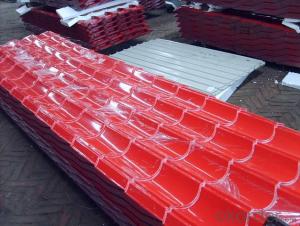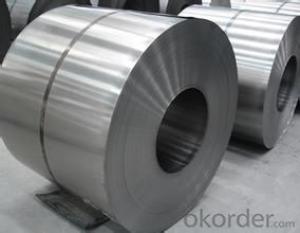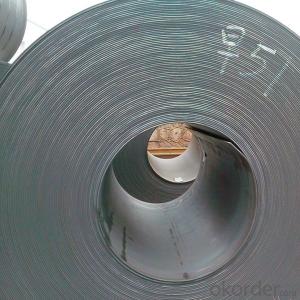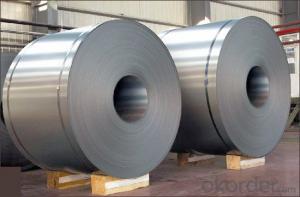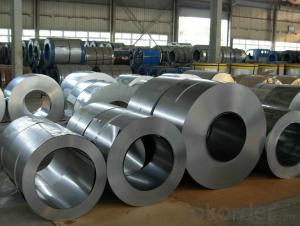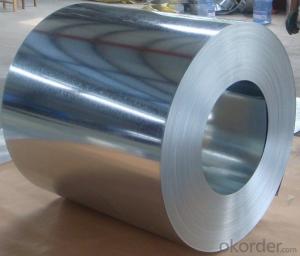Cold Rolled Steel Coil with Prime Quality, various sizes and Lowest price
- Loading Port:
- Tianjin
- Payment Terms:
- TT OR LC
- Min Order Qty:
- 500 m.t.
- Supply Capability:
- 20000 m.t./month
OKorder Service Pledge
OKorder Financial Service
You Might Also Like
1.Structure of Cold Rolled Steel Description:
The raw material of cold rolled steel coil/sheet is high quality hot rolled product, and after pickling continuous rolling, degreasing, annealing,skin pass,slitting and cut to length line etc. Along with it many kinds of new technology and new process of global cold rolling production have been applied. Therefore the quality of the goods could be guaranteed. The product is widely used in outdoor and interior decoration, furnishing manufacturing, home appliance, automobile etc.
2.Main Features of the Cold Rolled Steel:
• Excellent process capability
• Smooth and flat surface
• Workability, durability
• Excellent heat resistance performance
• High strength
• Good formability
• Good visual effect
3.Cold Rolled Steel Images
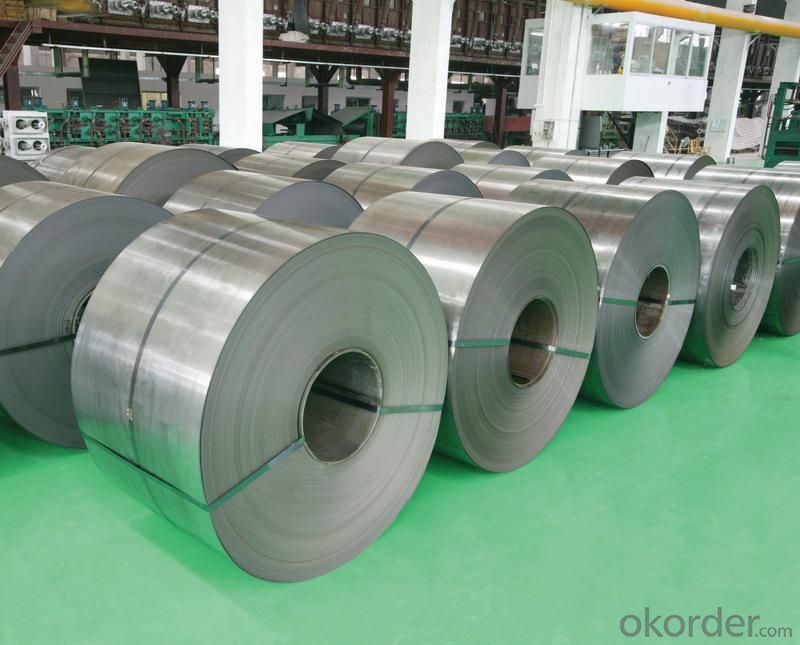
4.Cold Rolled Steel Specification
Standard:AISI,ASTM,DIN,GB,JIS,JIS G3302 ASTM 653M EN10142
Grade: Q195~Q345
Thickness: 0.16mm~1.5mm,0.16-1.5mm
Width: 1250,600-1250mm
Coil weight:3-12 MT
Coil ID:508/610mm
Chemical composition:
C | Si | Mn | Cr | Ni | P | S |
0.150 | 0.476 | 11.231 | 12.50 | 0.900 | 0.039 | 0.010
|
5.FAQ of Cold Rolled Steel
We have organized several common questions for our clients,may help you sincerely:
1.How about your company?
A world class manufacturer & supplier of castings forging in carbon steel and alloy steel,is one of the large-scale professional investment casting production bases in China,consisting of both casting foundry forging and machining factory. Annually more than 8000 tons Precision casting and forging parts are exported to markets in Europe,America and Japan. OEM casting and forging service available according to customer’s requirements.
2.How to guarantee the quality of the products?
We have established the international advanced quality management system,every link from raw material to final product we have strict quality test;We resolutely put an end to unqualified products flowing into the market. At the same time, we will provide necessary follow-up service assurance.
3. How long can we receive the product after purchase?
Usually within thirty working days after receiving buyer’s advance payment or LC. We will arrange the factory manufacturing as soon as possible. The cargo readiness usually takes 15-25 days, but the shipment will depend on the vessel situation.
- Q: What are the different methods of uncoiling steel coils?
- There are several different methods of uncoiling steel coils, depending on the specific requirements and equipment available. Some common methods include: 1. Uncoiling by hand: This method involves manually unwinding the coil by hand using a bar or rod inserted through the inner diameter of the coil. It is typically used for smaller coils or when other methods are not available. 2. Uncoiling with a mandrel: A mandrel is a cylindrical tool that supports the inner diameter of the coil and allows it to rotate freely. The coil is placed on the mandrel, which is then rotated to unwind the steel. 3. Uncoiling with a decoiler machine: Decoiler machines are designed specifically for uncoiling steel coils. They typically consist of a mandrel or drum that holds the coil, along with a motorized mechanism that rotates the coil and controls the speed of unwinding. Decoilers can handle larger and heavier coils, making them suitable for industrial applications. 4. Uncoiling with a straightener-feeder: This method is often used when the steel coil needs to be straightened and fed into a production line simultaneously. The coil is passed through a set of straightening rollers to remove any curvature, and then fed into the subsequent processing equipment. 5. Uncoiling with a recoiler: Recoilers are used when the steel coil needs to be rewound into a new coil. The original coil is uncoiled using one of the aforementioned methods, and then the steel is rewound onto a new mandrel or drum to create a smaller coil. It is important to note that the choice of uncoiling method depends on various factors such as the size and weight of the coil, the desired level of automation, and the specific production requirements.
- Q: How do steel coils contribute to the manufacturing of construction materials?
- Steel coils play a crucial role in the manufacturing of construction materials by providing a versatile and reliable source of raw material. These coils are manufactured from high-quality steel and are typically used as a primary input in various construction processes. One of the main contributions of steel coils in construction material manufacturing is their ability to be shaped and formed into different products. These coils can be easily cut, bent, and molded to create a wide range of construction materials such as beams, pipes, and sheets. This versatility allows manufacturers to produce customized construction components that meet specific project requirements. Furthermore, steel coils provide strength and durability to construction materials. Steel is known for its exceptional tensile strength, which makes it an ideal choice for load-bearing structures and components. By using steel coils, manufacturers can produce construction materials that can withstand heavy loads, extreme weather conditions, and other environmental factors, ensuring the longevity and safety of the final construction product. In addition, steel coils offer consistency in quality and performance. The manufacturing process of steel coils involves stringent quality control measures, ensuring that the final product meets the required specifications. This consistency in quality gives construction material manufacturers the confidence to produce reliable and high-performance products consistently. Steel coils also contribute to the efficiency of construction material manufacturing. The availability of steel coils in large quantities and standardized dimensions allows for streamlined production processes. Manufacturers can optimize their operations by utilizing automated machinery and processes, reducing production time and costs, and increasing overall efficiency. Overall, steel coils are an essential component in the manufacturing of construction materials. Their versatility, strength, consistency, and efficiency make them a preferred choice for construction material manufacturers. By using steel coils, manufacturers can create high-quality and reliable construction materials that contribute to the safety, durability, and aesthetics of various construction projects.
- Q: Steel is no doubt a better constructin material but it is only in practice in developed country.i would like that we should high lights the benifits and negatives of steel to make the steel more clear as a construction material.Hope some expert to address this topicMD
- Steel Structure considered as the most efficient and fast in completion of any project, specially the high rise buildings, also the logistics during construction is less complicated than the normal methods, Steel Structure has so many advantages vs the disadvantages, and highly recommended for commercial buildings
- Q: Can steel coils be coated with epoxy?
- Yes, steel coils can be coated with epoxy. Epoxy coatings are commonly used to protect steel from corrosion and provide a durable finish.
- Q: What are the different grades of steel used for coils?
- The different grades of steel used for coils vary depending on the specific requirements and applications. Some common grades include low-carbon steel (e.g., ASTM A36), medium-carbon steel (e.g., ASTM A516), high-strength low-alloy (HSLA) steel (e.g., ASTM A572), and stainless steel (e.g., 304 or 316). Each grade offers distinct properties such as strength, corrosion resistance, and formability, enabling manufacturers to choose the appropriate one based on their needs.
- Q: How are defects in steel coils detected and resolved?
- Defects in steel coils are typically detected through various non-destructive testing methods such as visual inspection, ultrasonic testing, magnetic particle testing, and eddy current testing. Once a defect is identified, it is resolved through processes like grinding, polishing, welding, or cutting out and replacing the affected area. The specific resolution method depends on the type and severity of the defect, ensuring that the steel coils meet the required quality standards before further processing or usage.
- Q: I bought a stainless steel mood ring two days ago, but would it rust?Thanks in advance!
- This Site Might Help You. RE: Do stainless steel mood rings rust? I bought a stainless steel mood ring two days ago, but would it rust? Thanks in advance!
- Q: I have a mountain bike w/ 26 wheels. My question is what's the biggest difference between aluminum vs. steel? If most of my riding is off-road, wouldn't the steel wheels be stronger/more durable?
- Aluminum is by far the better choice for wheels, mirageguitarwork is right on the money with his description. One other thing that detracts from steel wheels is that they rust. Wheel builders used to chrome plate them, but all this did was add weight. The wheels would eventually still rust, and this weakens them even more.
- Q: Why can't the coil weight be too low?
- And may make the level stacked steel coil collapse, rolling, produce production safety accidents.
- Q: What are the different methods of skin pass rolling for steel coils?
- There are several methods of skin pass rolling for steel coils, including dry skin pass, wet skin pass, and temper rolling. Dry skin pass involves using a roller with a specific surface texture to improve the appearance and flatness of the steel coil. Wet skin pass, on the other hand, involves applying a thin layer of oil or water during the rolling process to enhance the surface finish and prevent oxidation. Temper rolling is a method used to improve the mechanical properties of the steel coil by subjecting it to a controlled amount of cold deformation. Each method is employed based on the desired outcome and specific requirements of the steel product.
Send your message to us
Cold Rolled Steel Coil with Prime Quality, various sizes and Lowest price
- Loading Port:
- Tianjin
- Payment Terms:
- TT OR LC
- Min Order Qty:
- 500 m.t.
- Supply Capability:
- 20000 m.t./month
OKorder Service Pledge
OKorder Financial Service
Similar products
Hot products
Hot Searches
Related keywords
